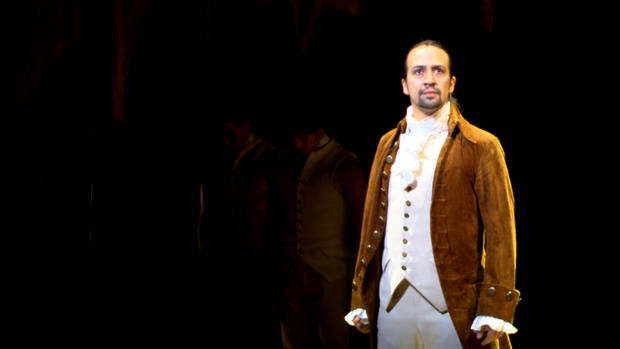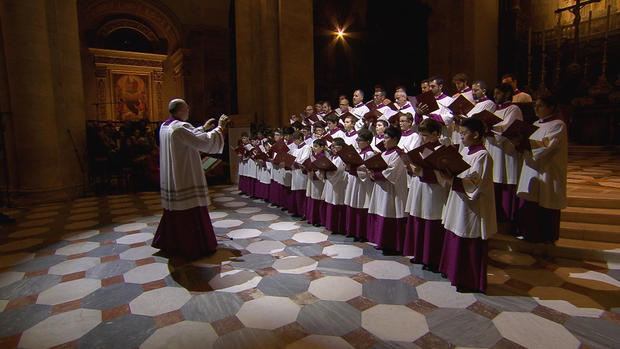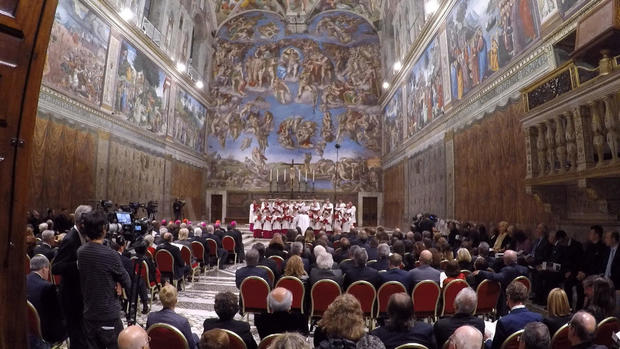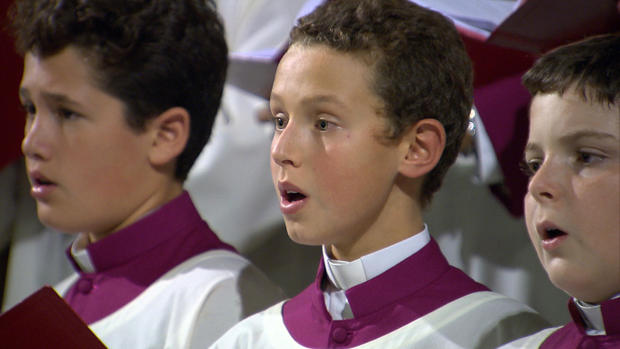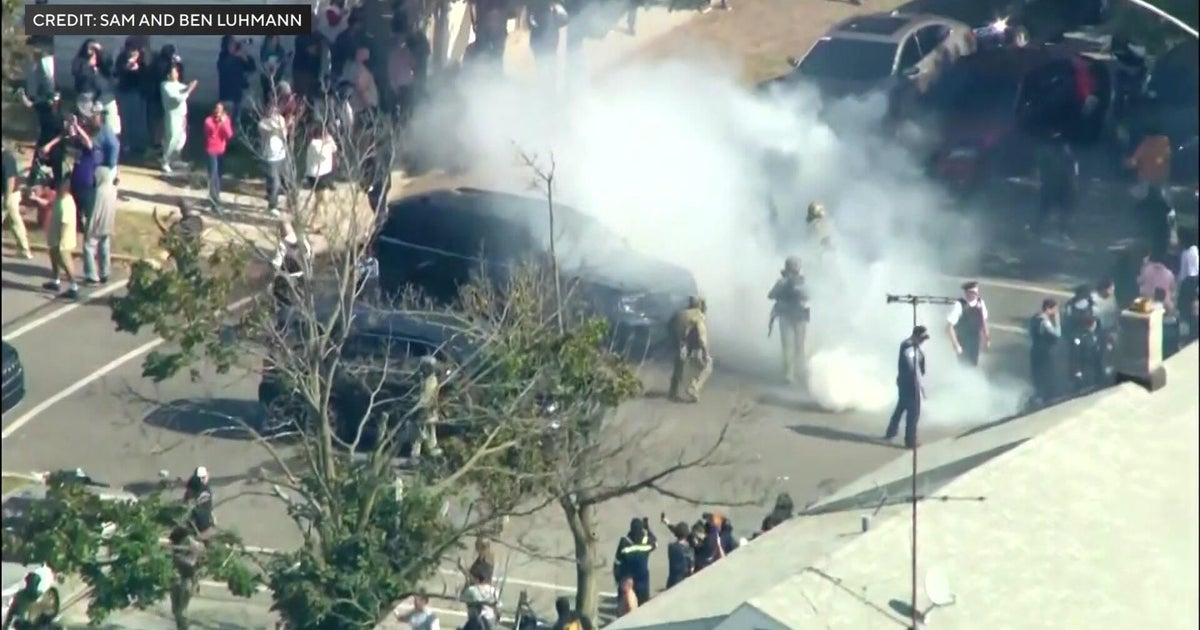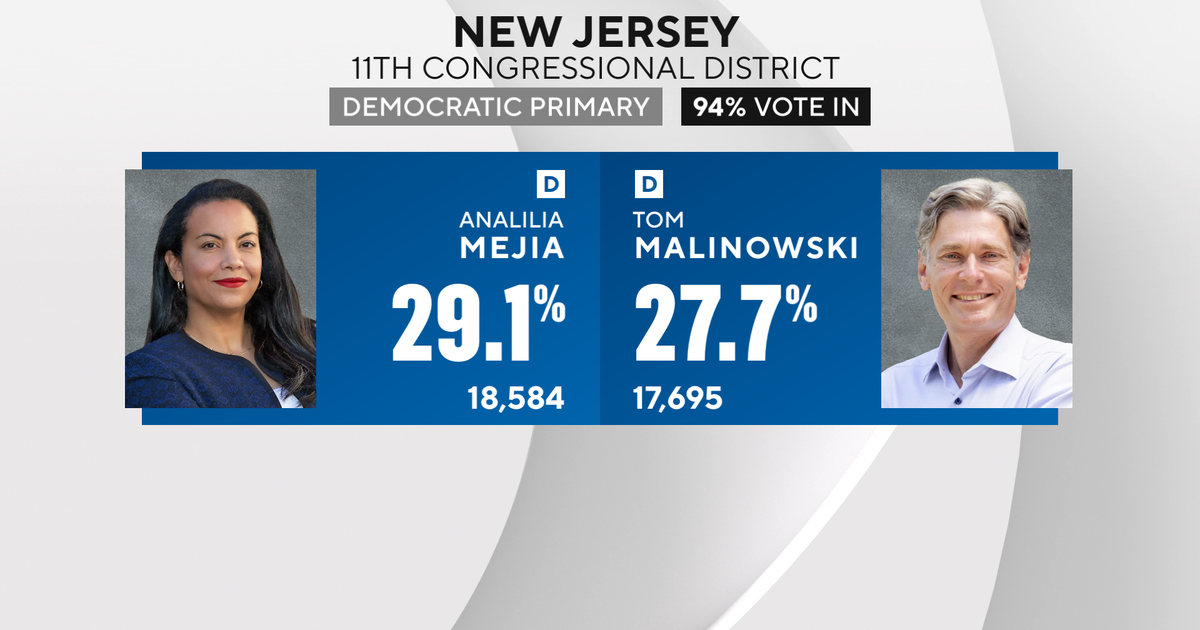60 Minutes Presents: A Front Row Seat
The following script is from “60 Minutes Presents: A Front Row Seat,” which aired on Feb. 5, 2017. Charlie Rose is the correspondent.
Good evening, I’m Charlie Rose. Welcome to “60 Minutes Presents.” Tonight: Front row seats for extraordinary musical performances, both on Broadway and in Rome.
We begin with an encore presentation of our story about the breakthrough musical “Hamilton.” While the original cast has moved on, the show is thriving, opening in cities across the country. And its creator, thirty-seven-year-old Lin-Manuel Miranda, is collecting awards, writing, acting and song-writing, the same hard work that led to his masterpiece. We originally broadcast this story sixteen months ago, shortly after opening night on Broadway. Tonight, you’ll see an expanded version that includes more of the remarkable performances, and more about Hamilton himself, who was one of the most brilliant figures in American history.
Lin-Manuel Miranda: The thing about Hamilton is he spoke in paragraphs. So the opening sentence of our show is this crazy, run on sentence. “How does a bastard orphan, son of a whore and a Scotsman, dropped in the middle of a forgotten spot in the Caribbean by providence, impoverished in squalor, comma, grow up to be a hero and a scholar?” That’s the question we’re gonna answer for the next two hours and 45 minutes.
Alexander Hamilton: I’m past patiently waitin,’ I’m passionately smashin’ every expectation, every action’s an act of creation -
In “Hamilton,” the answers come fast.
Alexander Hamilton: First time I’m thinking past tomorrow! And I’m not throwing away my shot!
“My Shot” is the show’s anthem as Hamilton arrives in New York City during the American Revolution and sees his opportunity.
Cast singing: Rise Up! Rise Up, take a shot, take a shot, not throwing away my shot!
Lin-Manuel Miranda: It took me a year to write “My Shot” which is Hamilton’s big “I want” song.
Charlie Rose: It took you a year.
Lin-Manuel Miranda: Yeah. Because every couplet needed to be the best couplet I ever wrote. That’s how, that’s how seriously I was taking it.
Charlie Rose: Hamilton demands lots from you.
Lin-Manuel Miranda: Yes.
Charlie Rose: I mean he’s calling on your best.
Lin-Manuel Miranda: He’s calling on my best. Because he’s the smartest guy in the room. So I have to write from the perspective of the smartest guy in the room when the other people in the room are Jefferson and Washington and very smart guys.
Alexander Hamilton: Sir, entrust me with a command.
Hamilton was front and center at nearly every major event in early American history.
Aaron Burr: Man, the man is non stop!
He never became president, but had a bigger impact than many who did.
George Washington: Let me tell you what I wished I’d known,..
His mentor was George Washington, played here by Chris Jackson, who plucked Hamilton out of the ranks... and relied on him for 20 years.
Thomas Jefferson: So what did I miss? What did I miss?
Daveed Diggs originated the role of Thomas Jefferson, Hamilton’s primary political opponent.
Thomas Jefferson: I’ve been in Paris meeting lots of different ladies...I guess I basically missed the late 80s.
Alexander Hamilton: The bullets out your gun. The bullets out your gun.
The show reflects Miranda’s broad musical taste. But hip hop and rap define it.
Charlie Rose: Your music is hip hop. Your music is rap.
Lin-Manuel Miranda: Yes. I also believe it is uniquely suited to tell Hamilton’s story. Because it has more words per measure than any other musical genre. It has rhythm and it has density. And if Hamilton had anything in his writings it was this density.
Angelica Schuyler: I’m a girl in a world where my only job is to marry rich. My father has no sons so I’m the one who has to social climb for one, so I’m the oldest and the wittiest and the gossip in New York City is insidious.
Miranda wrote this for Hamilton’s sister-in-law Angelica Schuyler, played by Renee-Elise Goldsberry.
Schuyler sisters: And we just happen to be in the greatest city in the world!
In “Hamilton,” women get equal time.
Schuyler sisters: Work! Work! Angelica! Work! Work! Eliza! Work! Work! And Peggy! Work! Work! The Schuyler sisters!
Alexander Hamilton: Just you wait. Alexander Hamilton.
The idea to cast black and Latino actors to play the founders was deliberate. Miranda wanted to connect America then with America now.
Cast: You can never back down and never learn to take your time! Ooohh! Alexander Hamilton... Alexander Hamilton!
“Hamilton” blossomed during an extended run at New York’s Public Theater and was greeted with fireworks over the Hudson when it opened on Broadway.
Lin-Manuel Miranda: I come up here in the opening number.
The show has already reached the loftiest heights. In 16 months at the Richard Rodgers Theater, “Hamilton” has established itself as Broadway’s impossible ticket with premium seats selling for nearly a thousand dollars each and those lucky enough to get in never know who might be next to them.
Charlie Rose: The president of the United States.
Lin-Manuel Miranda: At our sixth preview.
Charlie Rose: The vice president of the United States.
Lin-Manuel Miranda: Yes. It’s put my dreams to shame. Yeah. It’s, it’s super, super humbling and when you list those boldface names that have come to see the show, I see those as an opportunity to see the show with fresh eyes while I’m doing it.
Charlie Rose: Oh, yeah.
Lin-Manuel Miranda: When Dick Cheney’s sitting in the audience, I think what is he thinking when he hears the lyric, “History has its eyes on you.” You know, when the president is here, what is he thinking as he sees George Washington say, “I have to step down the so the country can move on.”
Hamilton was a complicated figure: war hero, famous philanderer, political thinker, mud-slinging politician and the nation’s first treasury secretary.
Ron Chernow: He creates the first fiscal system, first monetary system, first customs service, first central bank, on, and on, and on.
Ron Chernow wrote the biography that inspired the musical and is the show’s historical advisor.
Ron Chernow: Here’s the story of a penniless, orphaned, immigrant kid who comes out of nowhere and sets the world on fire. And his achievements were absolutely monumental.
Charlie Rose: You say he came out of nowhere. Where is nowhere?
Ron Chernow: He was born on the island of Nevis.He spent his adolescence in St. Croix. His father abandoned the family when Alexander was 11. His mother died when he was 13. When he came to North America he didn’t know a soul.
Lin-Manuel Miranda: This is Inwood. This is where I grew up. We’re still playing dominoes in the street.
It is a story Miranda could relate to. His father graduated college at 18 in Puerto Rico and moved to Manhattan. Luis Miranda became a prominent political consultant...his wife Luz, a psychologist.
Luis Miranda: Luz and I, we have always known that this kid was destined for greatness.
Charlie Rose: He’s looking down.
Luis Miranda: My only concern was always, “Is his greatness gonna come with money, so he can survive forever?
Charlie Rose: When did you see the musical talent?
Luis Miranda: Always.
Luz Towns-Miranda: From the time he was tiny--
Luis Miranda: Always. (laugh)
Luz Towns-Miranda: He loved to sing. He was always creating and he loved words and songs.
At five, Miranda tested into Hunter College Elementary, a school for highly gifted children, where he told us sometimes, he felt like he did not belong.
Lin-Manuel Miranda: You know, I went to a school where everyone was smarter than me. And I’m not blowin’ smoke, I, my, I was surrounded by genius, genius kids. What’s interesting about growing up in a culture like that is you go, “All right, I gotta figure out what my thing is. Because I’m not smarter than these kids. I’m not funnier than half of them, so I better figure out what it is I wanna do and work really hard at that because intellectually I’m treading water to, to be here.”
Charlie Rose: So why do you think I’m sitting here talking to you and not sitting here talking to one of your classmates?
Lin-Manuel Miranda: ‘Cause I picked a lane and I started running
ahead of everybody else. So I, that’s the honest answer. It was like, I was
like, “All right THIS.”
“This” was theater.He was in practically every school play.
Lin-Manuel Miranda: This is upstairs. This is really where we grew up.
The family didn’t have a lot of money to see Broadway shows. But they did collect cast albums. And Miranda consumed them.
Charlie Rose: “Camelot,” “Follow Me,” “The Lusty Month of May.”
Lin-Manuel Miranda: “Lusty Month of May.” The, all of the wordplay. “If you may take me to the fair. You’ll thrash and bash him? I’ll smash and mash him?” You’ll, you know, “He will be trouble, he will be rubble.”
Charlie Rose: “If ever I would leave you.”
Lin-Manuel Miranda: “It would not be in springtime, knowing how in spring I’m bewitched by you so.”
Charlie Rose: How can you have so many songs in your head?
Lin-Manuel Miranda: Because I had a lot of time on my hands.
Charlie Rose: So many songs in your head.
Lin-Manuel Miranda: Um, yeah, well these were...
Charlie Rose: Do you have room for anything else in your head?
Lin-Manuel Miranda: I mean, I don’t know my Social Security Number.
He graduated from Wesleyan University in 2002 with a degree in theater arts. That’s where he began working on a show about his old neighborhood.
“In The Heights”: Lottery ticket, just part of the routine, everybody’s got a job, everybody’s got a dream.
It turned into Miranda’s first Broadway show. “In The Heights” won the 2008 Tony for best musical. Two months later, he picked up Ron Chernow’s book during a vacation.
Lin-Manuel Miranda: This is what I knew from high school. I knew Hamilton died in a duel with the vice president. I knew he was on the $10 bill. But really, I was just browsing the biography section. It could have been Truman.
Charlie Rose: And as you read it, what happened?
Lin-Manuel Miranda: I was thunderstruck. I got to the part where you know, a hurricane destroys St. Croix where Hamilton is living. And he writes a poem about the carnage and this poem gets him off the island.
Charlie Rose: You saw a rap artist in him.
Lin-Manuel Miranda: Yes. I drew a direct line between Hamilton’s writing his way out of his circumstances and the rappers I’d grown up adoring. It’s Biggie and Jay-Z writing about growing up in the Marcy Projects in Brooklyn. It’s Eminem writing about growing up white in Detroit. It’s writing about that struggle and paradoxically your writing being so good it gets you out.
Lin-Manuel Miranda: I’m thrilled that the White House called me.
Nine months after reading the book, he was invited to the white house to perform a song from “In The Heights.” He decided to take a risk.
Lin-Manuel Miranda: I’m actually, working on a hip-hop album. It’s a concept album about the life of someone who I think embodies hip hop, Treasury Secretary Alexander Hamilton -- You laugh?! But it’s true!
Charlie Rose: So when you did it, and you look at the video now.
Lin-Manuel Miranda: I see a terrified young Puerto Rican man.
Charlie Rose: Do you really?
Lin-Manuel Miranda: Terrified. Because there’s the leader of the free world, newly-elected leader of the free world. His entire family. There’s Biden.
Lin-Manuel Miranda: The ten dollar Founding Father without a father...
But as he began the story, the room was mesmerized.
Lin-Manuel Miranda: Moved in with a cousin the cousin committed suicide. Left him with nothing but ruined pride, something new inside, A voice saying “Alex you gotta fend for yourself,” He started retreatin’ and readin’ every treatise on the shelf. There would have been nothin’ left to do for someone less astute, He woulda been dead or destitute without a cent or restitution, Started workin - clerkin’ for his late mother’s landlord, tradin’ sugarcane and rum and all the things he can’t afford.
Lin-Manuel Miranda: That video’s a microcosm of my entire Hamilton experience. I say, “Hip hop, Alexander Hamilton,” and everyone laughs. And then, by the end, they’re not laughing. Because they’re in it. Because they’ve been sucked into the story, just like I got sucked into the story.
Hamilton: When we finally drive the British away LaFayette is waiting in Chesapeake Bay!
Miranda’s gift is bringing that story to today’s audiences...reminding them whom to thank for building this nation.
Hamilton: How you say, “No sweat!” We’re finally on the field. We’ve had quite a run.
Lafayette: Immigrants.
Hamilton/Lafayette: We get the job done.
Lin-Manuel Miranda: There’s a lot of ways in, right? If you’re scared of hip hop or you thought hip hop was not music for you, We’re gonna give you King George who sings a British-Invasion-style song from the ‘60s.
Charlie Rose: That’s a showstopper too.
Lin-Manuel Miranda: It’s a showstopper. And it’s a breath.
King George III: You say, the price of my love is not a price that you’re willing to pay.
The British king, played here by Jonathan Groff, scoffs at the colonists and European immigrants trying to go it alone.
King George III: You’ll be back. Soon you’ll see. You’ll remember you belong to me. You’ll be back. Time will tell. You remember that I served you well. Oceans rise. Empires fall! We have seen each other through it all!
Lin-Manuel Miranda: What’s interesting about that role, and I didn’t even really anticipate it when I was writing it, the king becomes the audience’s surrogate. As they watch this country being formed in front of their eyes, and the king goes, “Wait. You’re really gonna keep changing leaders? Wait. What are you gonna do now the war is over?”
Charlie Rose: Or you’re gonna come back.
Lin-Manuel Miranda: Oh, you’ll be back. He speaks to the country as if it was a girlfriend he didn’t treat well.
King George III: Cuz when push. Comes to shove. I will kill your friends and family. To remind you of my love. Da da da dat da da da da da ya da da dat da ya da.
Lin-Manuel Miranda: I think the secret sauce of this show is that I can’t believe this story is true. It’s such an improbable and amazing story and I learned about it while I was writing it. And I think that enthusiasm is baked into the recipe.
Some of the other cast members, and the story of the duel that ended Hamilton’s life when we come back.
A year and a half ago, the Broadway musical “Hamilton” struck like a cultural earthquake, shaking up the worlds of theater, music and American history… all at the same time. It even seems to have altered our money, after the Treasury Department scrapped plans to remove Alexander Hamilton’s face from the $10 bill. The man responsible is Lin-Manuel Miranda, who along with the rest of the original cast has moved on while the show lives on. In this encore presentation of our story on the musical, we’ll show you how Miranda took stories from history and made them accessible to today’s audience.
Lin-Manuel Miranda: I think we take great pains to knock these guys off their pedestals.
Charlie Rose: Yeah you do.
Lin-Manuel Miranda: This is Washington impatient and yelling, “Are these men with which I am to defend America?” Which he did as he was fleeing New York. That’s a quote. This is Jefferson and Hamilton squabbling. These guys didn’t get tablets in stone from on a mountaintop. They compromised. They made mistakes. Their fights led to precedents. And I think it’s an important reminder that they are as human as us.
George Washington: The issue on the table!
The tenor of their politics will sound familiar too. Hamilton’s debate with Jefferson over how to pay off the Revolutionary War debt was so intense, Miranda stages it as a rap battle...
George Washington: are you ready for a cabinet meeting?
...with Washington as referee...
Thomas Jefferson: In Virginia we plant seeds in the ground. We create. You just wanna move our money around. This financial plan is an outrageous demand and it’s too many damn pages for any man to understand. Stand with me in the land of the free. Pray to God we never see Hamilton’s candidacy. Look! When Britain taxed our tea, we got frisky. Imagine what’s gonna happen when you try to tax our whiskey.
George Washington: Thank you Secretary Jefferson!
Alexander Hamilton: Thomas that was a real nice declaration. Welcome to the present, we’re running a real nation. Would you like to join us, or stay mellow, doing whatever it is you do in Monticello.A civics lesson from a slaver, hey neighbor. Your debts are paid because you don’t pay for labor. ‘We plant seeds in the South. We create!’ Keep ranting. We know who’s really doing the planting!!
Hamilton’s combative nature made him monumental enemies including presidents Adams, Jefferson, Madison and Monroe. All downplayed Hamilton’s achievements and diminished his legacy. The only one to fare worse in the eyes of history was Hamilton’s killer, Vice President Aaron Burr. Miranda gives him a starring role.
Charlie Rose: Burr becomes your narrator?
Lin-Manuel Miranda: Yes.
Charlie Rose: Because you need what?
Lin-Manuel Miranda: Well, one, I need balance. Hamilton would be happy to narrate his own story.
Charlie Rose: Yeah. In paragraphs and paragraphs...
Lin-Manuel Miranda: In paragraphs and paragraphs. And also Burr is the mirror image of Hamilton. He’s also orphaned at a young age. Speeds through college. Speeds through Princeton in two years. Starts at 13. Age 13.
Charlie Rose: Just as smart as Hamilton?
Lin-Manuel Miranda: Just as smart as Hamilton. But every time Hamilton says go, Burr says stop. He’s just cautious
Aaron Burr: Hamilton doesn’t hesitate.
Burr was originally played by Leslie Odom Junior.
Aaron Burr: ... takes and he takes and he takes. And he keeps winning anyway. Changes the game. Plays and raises the stakes. And if there’s if there’s a reason he seems to thrive and so few survive then God damn it I’m willing to wait for it! I’m willing to wait for it!
Miranda explores the rivalry between Burr and Hamilton. From friends, to competitors, to political rivals...in one song, they finally become enemies.
Aaron Burr: I, wanna be in the room where it happens. The room where it happens.
Lin-Manuel Miranda: “Room Where It Happens” was the toughest jigsaw puzzle I’ve ever done.
A puzzle explaining how Hamilton, Jefferson and Madison made a backroom deal to move the U.S. capital from New York City to Washington DC in 1790. In the musical, this becomes the final straw for the man left out.
Aaron Burr: I’ve gotta be, I’ve got to be, in the room. The big old room! The art of the compromise. Hold your nose and shut your eyes.
Lin-Manuel Miranda: I’m both trying to explain this very complicated compromise that happened behind closed doors, and what makes it exciting in the context of our story is we’re telling it from the perspective of the one guy who wasn’t there: Aaron Burr. He says, “These guys just traded away the capitol of our country in exchange for an unprecedented, financial plan. It all happened over a dinner that none of us were at. None of us had any say in the decision.”
Charlie Rose: The room where it happens.
Lin-Manuel Miranda: The room where it happens
Aaron Burr and ensemble: I’ve got to be in the room where it happened, the room where it happened. I gotta be. I gotta be. In the rooooomm! Click! Boom!
For years, the story of Burr and Hamilton was hidden away in places like this, the New York Historical Society Library. It holds many of their original writings. This is where historian Ron Chernow researched the biography that inspired Miranda.
Ron Chernow: Lin-Manuel Miranda, I think, was smart enough to know that the best way to dramatize this story was to stick as close to the facts as possible. You want violence? There’s violence in the story. You want sex? There’s sex in the story.
Charlie Rose: You want power, there’s power in the story?
Ron Chernow: You want power in the story. This has all the ingredients.
Including the story of Hamilton’s political downfall. It began with a year-long affair with a young woman named Maria Reynolds. It turned into the nation’s first bona fide sex scandal.
Ron Chernow: I think that what makes the whole story so bizarre and unbelievable is that Hamilton ended up paying blackmail money to Mr. Reynolds. And this, at a time when Hamilton was not just the Treasury Secretary, but he was effectively, like, the prime minister of Washington’s government. So he was the most powerful man in the government.
When he was exposed, Hamilton did something no one expected: he confessed everything.
Ron Chernow: He wrote a 95-page pamphlet when even his closest friends thought that a delicately-worded paragraph or two would have done the trick.
Charlie Rose: I apologize, I made a mistake.
Ron Chernow: And that would have done it.
Jefferson & Madison: Alexander Hamilton had a torrid affair. And he wrote about it right there! Highlights!
In the show, Miranda uses Hamilton’s own words from what became known as “The Reynold’s Pamphlet.”
Jefferson & Madison & Burr: I had frequent meetings with her. Most of them at my own house. At his own house! At his own house! Damn!
The scandal was one big reason there was never a “President” Hamilton.
Jefferson & Madison & Burr: Never gonna be president now. Ain’t never gonna be president now. That’s one less thing to worry about!
Leslie Odom Jr: He’s made these dead white guys make sense to a bunch of, you know, black and brown people. He’s made them make sense in the context of our time with our music.
We spoke last fall with some of Miranda’s most important collaborators: forner cast-members Leslie Odom Junior... Renee Elise Goldsberry... Daveed Diggs... Phillipa Soo... and Chris Jackson.
Charlie Rose: What is it that connects? What are you hearing? What is it that’s resonating in these audiences?
Christopher Jackson: There’s so many different things happening in this story that it’s almost impossible to peg, I think, it’s just the music, or it’s just the movement, or it’s the lights, or it’s the staging. And it could be any number of those things. Or all of those things.
Charlie Rose: These are good female roles too, aren’t they?
Renee Elise Goldsberry: Yes they are. One of the things that’s exciting to me about playing Angelica Schuyler and feeling so powerful and knowing the time that we live in with Hilary running for president we get to show who the founding mothers are and what they did. They were not just sewing flags. They were actually the muse, like Angelica Schuyler was to Jefferson and Hamilton.
Phillipa Soo: My character is one of the only characters that doesn’t rap at all. And I don’t think that’s an accident, because I feel like Eliza, Eliza is about time. I have more time to express a very simple piece of information, as opposed to the rap.
Charlie Rose: Daveed, you said it gives you something you didn’t have before. Ownership of your own history.
Daveed Diggs: Yeah. Yeah. I mean, this is the only time I’ve ever felt particularly American, is in the last, like, eight months that I’ve been working on this.
“Hamilton” came back to life at a time when politics and immigration were the hottest topics in America. But it was Miranda’s writing that made it a juggernaut.
Charlie Rose: When you write, I mean I’ve been told you write, and if it’s sad, tears come to your eyes. You’re in the moment to express yourself.
Lin-Manuel Miranda: Yeah. I think of acting and writing as pretty much the same thing. It’s all about getting inside the skin of your characters, and seeing where they are, and knowing how they’ve grown up. You have to know all this, like, in your bones, what they’ve come up against, who they are. And then you just start talking as them. And you write until the rust comes out of the faucet and it’s clear water. And you write down the clear water.
Charlie Rose: ‘Cause the clear water is the perfection at the end of this.
Lin-Manuel Miranda: Well, it’s the stuff that feels true.
Ron Chernow: The bullet hit him actually on the right side.
Most people already know how the story of Alexander Hamilton ends. He died in a duel with Aaron Burr in 1804 in Weehawkin, New Jersey. By then, burr was a lame duck vice president. Hamilton, just shy of his 50th birthday, was practicing law.
Charlie Rose: How could that happen?
Ron Chernow: Dueling revolved around honor. You were protecting your honor.
Charlie Rose: But here are two men, they’re not ordinary politicians? They have a lot to lose?
Ron Chernow: Here were two politicians with their careers in decline who thought that they would establish their courage and manhood on the dueling ground. Burr was feeling very, very frustrated. It seemed like at every turn Alexander Hamilton was there, you know, blocking his path.
Lin-Manuel Miranda: He writes in a letter before the duel. He said “There was no way this could have been avoided. We have been circling each other for a while. It was always going to come to this.”
Charlie Rose: This was gonna happen.
Lin-Manuel Miranda: This was gonna happen. They’re fundamentally different men. And they run in concentric circles until they meet.
Tommy Kail: And everything around them is moving.
Miranda and his director, Tommy Kail, staged the intensifying rivalry between the two men.
Charlie Rose on turntable: Ahhh...
Lin-Manuel Miranda on turntable: Yeah it’s pretty cool, right?
Charlie Rose on turntable: It’s really cool.
The turntable was essential.
Tommy Kail: It allows the propulsion of the show to continue, to continue this insistence of movement that Hamilton had in his life.
Alexander Hamilton: I imagine death so much it feels more like a memory.
Many historians -- including Chernow -- believe Hamilton deliberately fired into the air, throwing away his shot.
Wait!!!
It is a fatal miscalculation.
Aaron Burr: I hear wailing in the streets. Somebody tell me you better hide. They say Angelica and Eliza were both by his side when he died.
Lin-Manuel Miranda: Here’s the thing about Hamilton. I think Hamilton was ready to die from the time he was 14 years old. I think what he has is what I have, which is that thing of, “Tomorrow’s not promised. I gotta get as much done as I can.”
Charlie Rose: It’s not only good acting. It’s not only good music. People are saying it’s transformative.
Lin-Manuel Miranda: It’s certainly changed my life. But I think it’s because when great people cross our path, and I’m talking about Hamilton here, it forces us to reckon with what we’re doing with our lives, you know? At my age, Hamilton was treasury secretary and creating our financial system from scratch.
Charlie Rose: And building a country?
Lin-Manuel Miranda: Yeah. I wrote two plays.
The Pope’s Choir
It is the oldest choir in the world. Evidence of its existence dates back to the 7th century. Today, it’s called the Sistine Chapel Choir, but is more commonly known as the Pope’s Choir -- that’s because it’s at the pope’s side for all of the important papal celebrations. As we first reported in December, the choir performed in St. Peter’s Basilica during the pope’s Christmas Eve mass. The choir also sang at a private mass at the Vatican honoring the 80th birthday of Pope Francis. The choir may be dedicated to the pope, but historically it has held concerts on its own, especially at its home base, the magnificent Sistine Chapel. It was here, beneath Michelangelo’s breathtaking frescoes in one of the world’s greatest wonders, where we recently attended a concert staged by the Pope’s Choir.
The music is sacred, contemplative, mystical. It soars, whether in concert at the Sistine Chapel or during mass next door at St. Peter’s Basilica.
When the pope presides, the choir provides a holy soundtrack made up of 30 boys and 22 men, the choir helps spread the pope’s message.
Mark Spyropoulos: We have a job to inspire people. They may not understand a word of what’s going on at the Vatican. But when they hear us singing, we have to direct them to consider something which is transcendent and divine. That’s our job.
Mark Spyropoulos, a baritone from Britain, Vittorio Catarci, a bass from Italy, and Cezary Arkadiusz Stoch, a tenor from Poland, consider themselves more than just voices of the pope.
Charlie Rose: What does it mean that you’re called the Pope’s Choir?
Vittorio Catarci: Well, we are, we are…
Cezary Arkadiusz Stoch: The family.
Vittorio Catarci: Pope’s family.
Charlie Rose: Pope’s family.
Vittorio Catarci: Yes. His personal choir.
Pope Francis is the most popular pope in a generation. He spends much time tending to the poor and the dispossessed. It is this humility that also makes his choir feel at home, as Mark Spyropolous learned when he joined last year.
Mark Spyropolous: When I first met him, the whole thing was completely overwhelming. And he said, ‘You’re from London. Well, welcome to the Vatican’ like this. And I was expecting, you know, sort of (making sign of cross) I was so, so embraced and welcomed by this. I, it was very surprising, and very impressed by quite how, what a personal touch he had.
As it tours Italy, performing in some of the country’s great cathedrals, the choir sings in harmony.
But until recently the Pope’s Choir wasn’t worthy of the name or the settings where it sang. For decades, the choir lacked cohesion. Many members came from opera, and made sure they were heard.
Charlie Rose: The choir was called the “Sistine Screamers.”
Vittorio Catarci: We were aware that we were singing too loud.
Vittorio Catarci remembers the era of the booming voices. He’s been with the choir for 30 years and three popes.
Charlie Rose: Can you sing for me the difference between the way it was and the way it is now?
Vittorio Catarci: Oh, for example we used to sing (Sicut Cervus), and now we sing (Sicut Cervus). It’s completely different, because we are looking for a very spiritual sound, not a meaty sound.
The choir turned around after Maestro Massimo Palombella was hired in 2010 -- only the sixth man to be appointed director of the Pope’s Choir in 200 years.
Massimo Palombella: I did not have to invent a sound. I had to rediscover a sound which was the sound the choir once produced in the Sistine Chapel.
Palombella went back to the past, combining hi-tech and ancient texts, he studied endlessly, looking for the precise vocal range that Palestrina originally intended when he wrote the sacred music that provides the bulk of the choir’s repertoire. Palestrina composed his music with the Sistine Chapel in mind, after Michelangelo had finished painting his masterpiece.
Mark Spyropoulos: Palestrina was writing when, the paint was still wet, you know, the, of these incredible frescoes. And when we sing Palestrina, it’s not like looking at a fresco. It’s the equivalent of being in a fresco.
Maestro Palombella also softened the tone by hardening the workload. The choir went from rehearsing three hours a week to three hours a day.
Charlie Rose: So you have to be a perfectionist? Tough.
Massimo Palombella: That’s exactly right.
Charlie Rose: If you are on a journey of excellence how far along are you on your journey?
Massimo Palombella: Circa a meta.
Charlie Rose: Halfway.
Charlie Rose: You sound like an American sports coach.
Vittorio Catarci: A choir is a very, very terrifying beast, because, if you are not able to handle it, it goes away. It runs away.
Cezary Arkadiusz Stoch: This not safari. This is more dangerous.
Vittorio Catarci: You have to handle the choir. We were compared to a Ferrari. But you have to drive Ferrari to do dressage like, you know, the horses. Just little bend, little, you know, very, light. Dressage, dressage, not vroom!
At rehearsal and in concert, Palombella conducts the choir like a manic traffic cop.
The maestro was born on Christmas day but with his choir he’s not always in a holiday mood. For the boys in the choir, commands from the maestro can be jolting.
Charlie Rose: And when he’s not happy Lorenzo?
Lorenzo Malizia: Eh, eh, he has moments of…
Charlie Rose: What?
Lorenzo Malizia: He has some explosions of anger but then he calms down because then we sing the piece properly.
13-year-old Lorenzo Malizia is one of the boys, all sopranos, who are able to produce the high notes that give the choir its celestial sound. Just listen to how the boys warm up.
The Vatican refers to them as the “white voices” for the purity of their sound.
At home, like many Italian boys their age, they have ordinary pictures on their walls and then there are reminders of why the boys are extraordinary.
Charlie Rose: So when people ask you about the pope what do you tell them?
Riccardo Catapano: They ask us how is the pope? Is he fun? Does he always crack jokes? We say yes, yes, it’s true, so he’s fun.
13-year-old Riccardo Catapano has been in the Pope’s Choir for four years.
Charlie Rose: I’d be nervous if I were singing in front of the pope.
Riccardo Catapano: I am little anxious but then I think that the pope does not understand anything about music, he only says how beautiful it sounds. So I continue to sing.
Across Rome, auditions for the choir are held in the second and third grades. Several times a year, instructors fan out to see who has the right timbre. Seven hundred boys are tested a year in all. It can be painstaking, few make it.
Only a dozen at most are selected annually. The chosen ones are sworn in during an elaborate ceremony…
Each are given five-year scholarships at a special school in the center of Rome. They aren’t studying to become priests, their curriculum runs the gamut.
They may be known as choir boys on Sundays but the rest of the week they are typical boys on the cusp of their teenage years. These are hallowed times for the boys, until the day arrives when their voices break and they must leave the Pope’s Choir. They can return as adults, but 11-year-old Emanuele Buccarella fears what’s coming soon.
“We recently did a concert and a man came up to me at the end of the concert and said that the choir that I conduct is missing one thing: wings.”
Charlie Rose: What happens when your voice breaks, will that be a sad day?
Emanuele Buccarella: For me, it will be an ugly moment when that time will come in which my voice will no longer be ready to sing the way we sing now. I try to make the most of everything now until that day will come in which they tell me my voice is no longer good to sing.
In their remaining time with the choir, their voices will join those of their adult brethren to bring the sounds of heaven to earth. The music of the Pope’s Choir speaks to the soul.
Massimo Palombella: We recently did a concert and a man came up to me at the end of the concert and said that the choir that I conduct is missing one thing: wings.
Charlie Rose: Wings, to go, as an angel.
Massimo Palombella: Like an angel.
